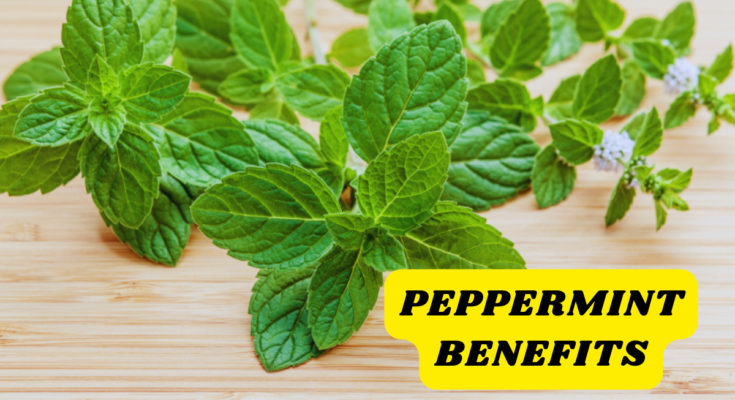PEPPERMINT :-
Peppermint is a herbaceous plant in the mint family, known for its minty and refreshing taste and aroma. Its scientific name is Mentha × piperita, and it is a hybrid of watermint and spearmint. Peppermint is commonly used in cooking, as a flavoring for food and beverages, and as an ingredient in herbal remedies and personal care products.
Peppermint has a long history of medicinal use and is believed to have many health benefits, such as relieving digestive issues, reducing inflammation, and promoting relaxation. Peppermint oil, which is extracted from the leaves of the plant, is also used in aromatherapy and as a natural remedy for headaches and other ailments.
Overall, peppermint is a versatile and widely used herb that is valued for its flavor and potential health benefits.
MEDICINAL USE AND HEALTH BENEFITS
Peppermint has been used for medicinal purposes for centuries, and is believed to have a number of health benefits. Some of the most commonly reported uses and potential benefits of peppermint include:
1. Digestive aid: Peppermint has a long history of use as a digestive aid, and is believed to help relieve indigestion, bloating, and other digestive symptoms. It may also help stimulate the production of bile, which can aid in the digestion of fats.
2. Pain relief: Peppermint has analgesic properties and may help relieve pain and inflammation. It is commonly used to treat headaches, muscle pain, and other types of pain.
3. Respiratory support: Peppermint may help relieve respiratory symptoms such as coughing and congestion, and may be beneficial for people with conditions like asthma and bronchitis.
4. Mood and relaxation: Peppermint has a calming effect on the body and may help reduce stress and anxiety. It is often used in aromatherapy to promote relaxation and improve mood.
5. Oral health: Peppermint is commonly used in oral care products like toothpaste and mouthwash, and may help improve oral health by reducing bacteria in the mouth and freshening breath.
6. Skin care: Peppermint oil may help soothe and cool the skin, and is often used in skincare products to relieve irritation and inflammation.
It’s important to note that while peppermint is generally considered safe for most people when used in moderation, it can cause side effects like heartburn and allergic reactions in some individuals. As with any herbal remedy, it’s always a good idea to talk to your healthcare provider before using peppermint for medicinal purposes.
HOW TO USE :-
Peppermint can be used in a variety of ways, depending on your needs and preferences. Here are some common methods of using peppermint:
1. Tea: Peppermint tea is a popular and easy way to enjoy the benefits of peppermint. Simply steep fresh or dried peppermint leaves in hot water for several minutes, strain, and enjoy. Peppermint tea can be consumed hot or cold, and may be sweetened with honey or other natural sweeteners if desired.
2. Inhalation: Peppermint oil can be added to a diffuser or vaporizer to create a refreshing and energizing aroma. You can also inhale peppermint oil directly from the bottle, or add a few drops to a bowl of hot water and inhale the steam.
3. Topical application: Peppermint oil can be diluted with a carrier oil, such as coconut or jojoba oil, and applied to the skin for a cooling and soothing effect. It may be helpful for relieving muscle pain, headaches, and other types of pain.
4. Culinary use: Peppermint leaves can be used to flavor food and beverages, and are commonly used in desserts, beverages, and savory dishes. Peppermint extract can also be added to recipes that require a minty flavor.
5. Herbal remedies: Peppermint is a common ingredient in herbal remedies for digestive issues, respiratory symptoms, and other health concerns. You can find peppermint supplements, capsules, and tinctures at many health food stores.
It’s important to note that peppermint oil should always be diluted before applying it to the skin, as it can be irritating in its undiluted form. Additionally, if you are pregnant, breastfeeding, or taking medication, it’s always a good idea to talk to your healthcare provider before using peppermint for medicinal purposes.



